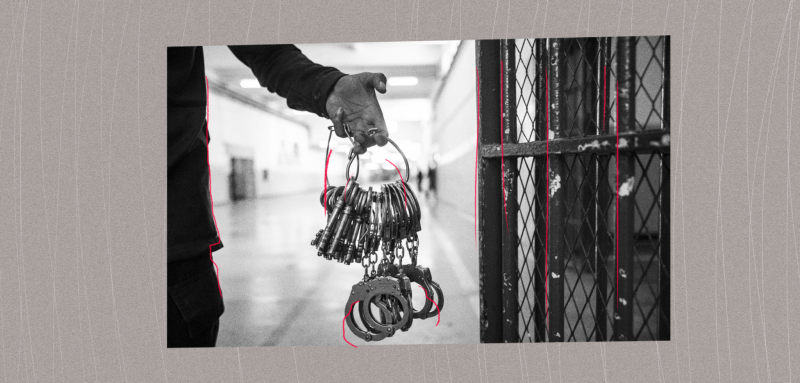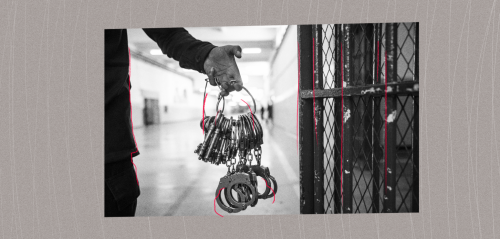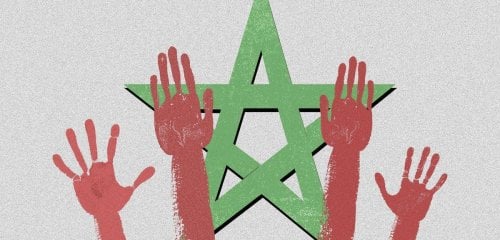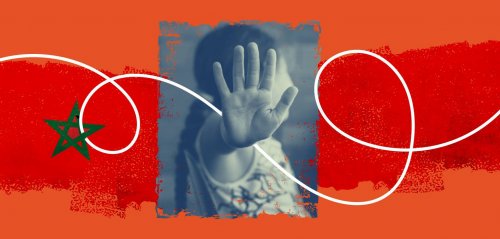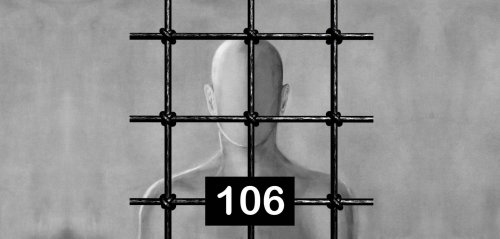Moroccan prisons are witnessing unprecedented overcrowding and a significant increase in the number of unmarried individuals imprisoned during their most productive years. As of 2022, the number of prisoners exceeded 97,000, with 60% of them being unmarried individuals. This record-breaking figure reflects the rapid pace at which the prison population has been growing in recent years, with an increase of 10 percent. This is a "worrisome" percentage, according to a recent annual report by the General Delegation for Prison Administration and Reintegration–DGAPR (a government institution).
Despite the construction of new prison facilities and the expansion of existing ones to increase the housing capacity, which reached a total of 75 institutions in 2022 (including 65 local prisons, 6 agricultural prisons, 2 central prisons, and 2 reform and rehabilitation centers), they still are not enough. The prisons continue to face significant overcrowding and pose challenges to the responsible authorities, raising questions about the reintegration and rehabilitation policy being pursued. A large number of convicts, most of whom are young, return to prisons shortly after their release. The percentage of prisoners in Morocco who are under 30 years old reaches 48.18 percent, while the percentage of pretrial detainees, that is, those held in prisons during the investigation or trial period, reaches 41 percent. This necessitates a reconsideration of the system because it is facing a real dilemma that presents challenges to the Moroccan judiciary.
Arbitrary pre-trial detention
For this reason, in recent years, numerous human rights voices have called for an end to arbitrary pre-trial detention in Morocco, advocating for alternative punishments to alleviate prison overcrowding, humanize punishment, and prevent the destruction of the lives of individuals sentenced to misdemeanors with a maximum sentence of two years. As part of the efforts to amend Moroccan criminal law, including alternative punishments, Moroccan Minister of Justice Abdellatif Ouahbi proposed that prisoners could buy out their sentences. This proposal has sparked significant controversy and varying opinions, with some viewing it positively, asserting that alternative punishments would benefit society in ways that prison fails to achieve, especially for those convicted of non-criminal offenses and misdemeanors, while others perceived it as negative, promoting discrimination and inequality based on wealth, as only the financially privileged would be able to afford such buyouts. Furthermore, there are concerns about the decline of deterrence in this regard, a crucial aspect of the law that ensures community safety and security.
Numerous human rights voices have called for an end to arbitrary pretrial detention in Morocco, advocating for alternative punishments to alleviate prison overcrowding, and prevent the destruction of the lives of individuals sentenced to misdemeanors
In this context, Habib Belkouch, an expert in human rights and the president of the Center for Human Rights and Democracy Studies, says in a statement to Raseef22 that "the efforts made by Morocco in improving the prison conditions cannot be denied, nor can the significant achievements of the General Delegation for Prison Administration be overlooked. However, overcrowding remains a central obstacle to reform, as it is the result of an outdated criminal policy that requires a complete review in terms of philosophy, legislation, and policy through the reform of the criminal law and the law of criminal procedure in the first place."
A high arrest rate
According to Habib Belkouch, who previously supervised a report on the "Situation of Prisons in Morocco in Light of International Standards and National Legislation and the Need of Reform 2016-2020", the arrest and detention rate in Morocco (251 prisoners out of 100,000 people in 2022, according to the report by the General Delegation for Prison Administration and Reintegration), is much higher than neighboring countries in North Africa and is among the highest rates globally. This indicates that prison overcrowding is closely linked to the excessive use of custodial sentences and the lack of sufficient space in prison facilities, or due to an inadequate geographical distribution of prisons that does not align with actual needs.
Despite the construction of new prisons, Moroccan prisons remain overcrowded due to issues within the Moroccan judicial system. So what is the solution?
Moulay Idriss Agoulmam, the Director of Social and Cultural Action and Prisoner Reintegration in the Moroccan Prison Administration, confirms in a statement to Raseef22 that the number of detainees in Morocco "has seen a continuous increase in recent years, leading to significant overcrowding in most prisons, as stated in the General Delegation's 2022 activities report. Despite efforts to increase accommodation spaces and the capacity of prison institutions through the construction of new prisons, it has been evident through practice that this measure cannot be a solution to a problem that has become structural."
Building new prisons is not the solution
The official points out that the General Delegation's strategy in building new prison facilities aims not only to increase capacity but also to achieve several strategic objectives. These include replacing old prisons with modern ones that meet the required specifications, implementing rehabilitation programs for reintegration, and humanizing the conditions of detention within the framework of an approach that emphasizes respect for the dignity of prisoners and the preservation of their rights in all initiatives. It is worth noting that, for example, over the past ten years, 26 new facilities were constructed to replace 23 old and dilapidated prison institutions that did not meet minimum security or rehabilitation conditions.
Agoulmam explains that "building new prisons may contribute, in some cases, to temporarily alleviate the severity of overcrowding, but this approach is not a definitive solution to this phenomenon, which needs to be analyzed to diagnose its root causes and take practical initiatives, both at the legislative and procedural levels, to address it."
Poor judicial management
As for Shakib al-Khiyari, a human rights activist, he attributes prison overcrowding primarily to the high percentage of pre-trial detainees, which accounts for 41% of the total prison population. According to the same report, short-term sentences of two years or less top the list of imposed penalties, accounting for 50% of all convictions. Even temporary release is granted to only about 5% of them.
Over the past ten years, 26 new facilities were constructed to replace 23 old and dilapidated prison institutions
Al-Khiyari says in a statement to Raseef22 that "prison overcrowding is primarily a judicial issue because there is an excessive reliance on this exceptional measure according to the criminal law, not only in Morocco but even in comparison with other countries. Pre-trial detention is an exceptional and relative legitimate violation of the presumption of innocence., but in Morocco, the judicial management makes it the norm." He further emphasizes that the "poor judicial management" of pre-trial detention and the poor response to requests for alternative measures that would reduce prison populations, have a negative impact on the quality of services provided in these institutions, including healthcare, nutrition, education, work, and more.
Alternative punishments
Regarding alternative penalties and punishments, Habib Belkouch says that this is an important solution that can be resorted to in order to alleviate prison overcrowding, expand the punishment network, explore alternatives or new sentences for some crimes, as well as reduce pre-trial detention and minimize the use of short prison sentences. Building new prisons is not the solution because various studies have shown that "the more prisons are built, the more they get filled." Here, one can consider Morocco's experience in establishing 16 prison facilities over the past five years has had no real impact, especially since the overcrowding situation has worsened.
On the other hand, Moulay Idriss Agoulmam, an official at the General Delegation for Prisons and Reintegration, states that "alternative penalties, as an alternative to custodial sentences and freedom-depriving penalties, should naturally result in reducing the number of detainees in prison institutions, which should lead to a reduction in prison overcrowding. I believe that confirming this requires waiting for the implementation of this law and its provisions to assess its effects on reducing prison overcrowding."
Morocco's experience in establishing 16 prison facilities over the past five years has had no real impact, especially since the overcrowding situation in the country has worsened.
For his part, human rights activist Shakib al-Khiyari affirms that alternative penalties are a measure that can ensure the punishment of the convict without destroying their life. It would also guarantee the release of cases that have no justification for their continued presence in prison. However, this "can be hindered by the inclinations of some judges who may impose sentences of more than two years to prevent the convict from benefiting from this measure due to their wide discretionary powers granted by legislation. Moreover, this measure could be subject to corruption (offered up for sale) by a group of corrupt individuals if it is not legislatively fortified and if impartial judges are not appointed by reviewing the current system for their appointment."
The failure of the rehabilitation and reintegration policy
If Morocco has developed many strategies and sectoral programs for the social, economic, and cultural reintegration of prisoners, by the General Delegation of Prisons and Reintegration and the Mohammed VI Foundation for the Rehabilitation of Prisoners, many national reports, including the Moroccan Observatory of Prisons, reveal the failure of this policy and consider rehabilitation and reintegration as "one of the manifestations of the prison and punitive crisis in Morocco" with its consequences.
The Observatory's report indicates that "the reality of reintegration in prison facilities in Morocco and the signs of failure within it are among the greatest risks facing age groups that return to crime, and whose sentences are short and medium-term, and therefore have no chances of integration, which creates a connection with crime."
According to al-Khiyari, the legislator should establish non-revengeful punishments and penalties with humanitarian dimensions that aim to reform and rehabilitate the convicted person to live in society that is better for both them and the community. In this context, the current system of retaliatory detention should be excluded.
The integration of prisoners is of everyone's concern
Agoulmam emphasizes that among the important tasks entrusted to this institution, in addition to security tasks, is the task of rehabilitating prisoners for social integration after their release, as an implementation of its social role towards a segment of society that has committed acts in violation of the law.
In order to fulfill this social and humanitarian mission, "the General Delegation has adopted a renewed and innovative approach to seek new and modern ways to achieve real and effective rehabilitation for prisoners, drawing on its conviction of the need to create initiatives that align with the rehabilitation needs of detainees, within the framework of a methodology that aims to make rehabilitation programs unique and diversified."
Raseef22 is a not for profit entity. Our focus is on quality journalism. Every contribution to the NasRaseef membership goes directly towards journalism production. We stand independent, not accepting corporate sponsorships, sponsored content or political funding.
Support our mission to keep Raseef22 available to all readers by clicking here!
Interested in writing with us? Check our pitch process here!
